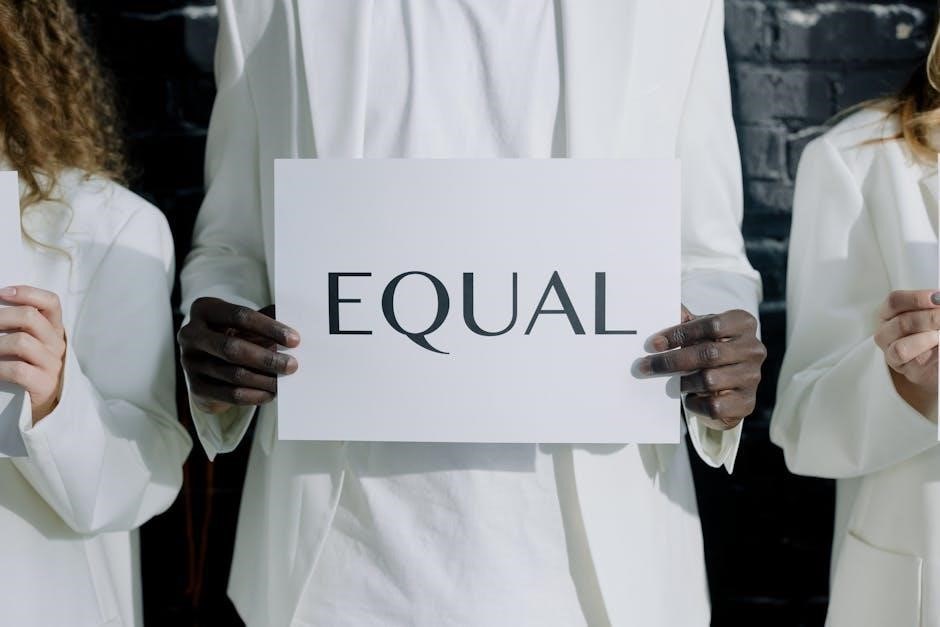Weingarten Rights, established by the 1975 Supreme Court case NLRB v. J. Weingarten, Inc., guarantee employees the right to union representation during investigatory interviews that could lead to discipline, safeguarding workplace fairness and protecting employees’ interests.
1.1 Definition and Origin
Weingarten Rights are legal protections ensuring employees can request union representation during investigatory interviews that may lead to discipline. Originating from the 1975 Supreme Court case NLRB v. J. Weingarten, Inc., these rights are outlined in Section 7 of the NLRA, providing employees with a safeguard against unfair questioning and promoting workplace fairness through collective bargaining rights.
1.2 Historical Context: The 1975 Supreme Court Case
The 1975 Supreme Court case NLRB v. J. Weingarten, Inc. established the legal precedent for Weingarten Rights. This landmark decision ruled that employees have the right to union representation during investigatory interviews, ensuring protection against coercive questioning and safeguarding workers’ rights under the National Labor Relations Act (NLRA), thus fostering a fairer workplace environment through collective bargaining protections.
1.3 Importance of Weingarten Rights in the Workplace
Weingarten Rights are crucial for ensuring fairness and transparency in workplace investigations. They protect employees from coercive questioning and safeguard against unfair discipline, fostering trust and security. By guaranteeing union representation, these rights promote a balanced power dynamic, empowering employees and reinforcing their legal protections under the NLRA, ultimately contributing to a more equitable work environment.
Key Provisions of Weingarten Rights
Weingarten Rights ensure employees’ right to union representation during investigatory interviews that could lead to discipline, protecting them from coercive questioning and ensuring fair treatment under the NLRA.
2.1 The Right to Union Representation
The right to union representation under Weingarten Rights allows employees to request a union representative during investigatory interviews, ensuring they are not coerced or intimidated. This protection, established by the Supreme Court, guarantees employees can have a representative present to assist and advocate for them during such meetings, promoting fairness and transparency in workplace proceedings.
2.2 Conditions for Invoking Weingarten Rights
Weingarten Rights can be invoked during investigatory interviews where an employee reasonably believes discipline may result. The interview must involve management questioning to gather facts, and the employee must request representation. These conditions ensure employees are protected from coercive or intimidating situations, aligning with Section 7 of the NLRA, which safeguards collective bargaining rights and workplace fairness.
2.3 Protections Under Section 7 of the NLRA
Section 7 of the NLRA safeguards employees’ rights to engage in concerted activities, including seeking union representation. This protection ensures employees can collectively bargain and discuss workplace issues without retaliation. Weingarten Rights fall under this provision, granting employees the legal backing to request representation during investigatory interviews, thereby reinforcing workplace democracy and individual rights.

When Do Weingarten Rights Apply?
Weingarten Rights apply during investigatory interviews where an employee reasonably believes disciplinary action may result. These rights ensure employees can request union representation to protect their interests during such meetings.
3.1 Investigatory Interviews Defined
An investigatory interview is a meeting where a supervisor questions an employee to gather information about specific incidents or concerns that could lead to disciplinary action. These interviews are formal in nature and are conducted to determine whether an employee has violated company policies or procedures, requiring the presence of a union representative if requested by the employee.
3.2 Criteria for Determining an Investigatory Interview
An investigatory interview is defined by its purpose to gather facts about potential policy violations or misconduct. It involves direct questioning by a supervisor, carries a reasonable belief that discipline may follow, and occurs in a formal setting. The employee’s reasonable belief of potential repercussions is a key factor in determining the applicability of Weingarten rights.
3.3 Situations Where Rights Are Not Applicable
Weingarten rights do not apply during routine performance evaluations, casual conversations, or non-disciplinary meetings. They are also inapplicable if the interview does not involve potential discipline or if the employee does not reasonably believe adverse consequences may result. Additionally, these rights do not extend to non-union employees or situations outside the scope of investigatory interviews.

Role of Union Representatives
Union representatives play a crucial role in protecting employees’ rights during investigatory interviews by providing support, clarifying procedures, and ensuring fair treatment, as outlined in the Weingarten Rights PDF.

4.1 Responsibilities During Investigatory Interviews
Union representatives are responsible for ensuring employees understand their rights, providing guidance during questioning, and advocating for fair treatment. They may also clarify management’s intent, challenge unfair questions, and document discussions to protect employees’ interests, as detailed in the Weingarten Rights PDF.
4.2 Limits of Union Representative Involvement
Union representatives cannot interfere with questioning or prevent employers from conducting investigations. Their role is advisory, ensuring procedures are fair and rights are upheld. They cannot answer questions on behalf of employees but can request clarification and ensure management adheres to Weingarten Rights, as outlined in the Weingarten Rights PDF.
4.3 Communicating Effectively with Employers
Union representatives must clearly articulate employees’ rights and concerns to employers. Effective communication ensures that Weingarten Rights are respected and that investigations remain fair. Representatives should maintain professionalism, avoid confrontations, and focus on protecting employees’ interests, as detailed in the Weingarten Rights PDF.
Invoking Weingarten Rights
Employees can invoke Weingarten Rights by requesting union representation during investigatory interviews. This ensures fair treatment and protects their interests, as outlined in the Weingarten Rights PDF.
5.1 How to Request Representation
Employees must explicitly request union representation during investigatory interviews. This right, protected under Section 7 of the NLRA, ensures fair treatment. The request can be verbal or written, and employers must honor it once made, as detailed in the Weingarten Rights PDF.
5.2 Employer Obligations Upon Request
Upon an employee’s request for representation, employers must immediately halt the interview until a union representative arrives. They cannot coerce or retaliate against the employee for invoking their rights, as outlined in the Weingarten Rights PDF, ensuring compliance with the NLRA and maintaining a fair workplace environment.
5.3 Consequences of Denying Representation
Denying an employee’s request for union representation violates the NLRA, potentially leading to legal consequences, including invalidation of disciplinary actions and reinstatement of affected employees. Employers may face NLRB charges and be required to cease unfair labor practices, as detailed in the Weingarten Rights PDF, ensuring accountability for non-compliance.
Distinction Between Weingarten and Miranda Rights
Weingarten Rights grant unionized employees the right to representation during workplace investigations, while Miranda Rights protect individuals from self-incrimination during police interrogations, differing in scope and application.
6.1 Similarities and Differences
Weingarten and Miranda rights both protect individuals during questioning but differ in context. Weingarten rights apply to workplace investigations, ensuring union representation, while Miranda rights protect against self-incrimination in police custody. Both safeguard individuals’ rights but serve distinct legal purposes, with Weingarten focusing on employment and Miranda on criminal proceedings.
6.2 Legal Implications for Employees
Employees invoking Weingarten rights are legally protected from coercion during investigatory interviews. This ensures a fair process and prevents employers from making unilateral decisions without union input. Understanding these rights is crucial for employees to assert their protections effectively under labor laws, ensuring workplace justice and upholding collective bargaining principles.
6.3 Practical Applications in the Workplace
Employees can invoke Weingarten rights during investigatory interviews by requesting union representation. Employers must grant this request or postpone the interview. The Weingarten Rights PDF serves as a guide, outlining procedures and obligations for both employees and employers. It ensures transparency and fairness, empowering employees to assert their rights effectively while providing employers with clear compliance standards.

Employer Responsibilities and Violations
Employers must inform employees of their Weingarten rights, ensure procedural fairness during interviews, and face legal consequences for violations under the NLRA.

7.1 Informing Employees of Their Rights
Employers are required to inform employees about their Weingarten Rights, ensuring they understand when and how to request union representation. This includes providing clear, written policies and training. Failure to inform employees can lead to NLRA violations, emphasizing the importance of transparency and compliance in maintaining workplace fairness.
7.2 Procedural Requirements for Interviews
During investigatory interviews, employers must adhere to specific procedures to respect Weingarten Rights. This includes allowing employees to request a union representative without retaliation. Employers must grant a reasonable delay for the representative to arrive and ensure the representative can actively participate in the discussion. Failure to comply may result in NLRA violations, emphasizing the need for employers to uphold these procedural safeguards to maintain workplace fairness and legal compliance.

7.3 Remedies for Violations of Weingarten Rights
Violations of Weingarten Rights can result in overturning disciplinary actions, requiring employers to recognize union representation, or reinstating employees with back pay. The National Labor Relations Board (NLRB) may also order employers to cease and desist from such violations, ensuring employees’ rights are upheld. Remedies aim to restore fairness and deter future violations, protecting employees’ statutory entitlements under the NLRA.
Case Studies and Real-World Applications
This section highlights landmark cases, such as the 1975 Supreme Court ruling in NLRB v. J. Weingarten, Inc., demonstrating how these rights are applied practically in workplaces to protect employees’ interests during investigatory interviews, ensuring fairness and adherence to labor laws.
8.1 Landmark Cases Involving Weingarten Rights
The 1975 Supreme Court case NLRB v. J. Weingarten, Inc. is the cornerstone, establishing employees’ rights to union representation during investigatory interviews. Other notable cases, such as NLRB v. Checker Cab, have further clarified and strengthened these protections, ensuring employees’ rights are upheld in various workplace scenarios, emphasizing the importance of fair representation and due process in disciplinary proceedings.
8.2 Examples of Successful Invocation
There are numerous examples where employees successfully invoked their Weingarten rights, ensuring fair representation during investigatory interviews. In one case, a manufacturing worker faced disciplinary action but requested union representation, leading to a fair resolution. Similarly, a healthcare employee under investigation for misconduct successfully used their rights to prevent unjust actions, highlighting the practical impact of these protections in safeguarding employees’ interests and promoting workplace justice.
8.3 Lessons Learned from Past Violations
Past violations of Weingarten rights highlight the importance of employer compliance with Section 7 of the NLRA; Cases where representation was denied led to legal repercussions, emphasizing the need for clear communication and respect for employee rights. These incidents underscore the importance of training and awareness for both employers and employees to prevent future violations and ensure fair workplace practices.

Accessing Weingarten Rights Through Official Documents
The Weingarten Rights PDF serves as a valuable resource, detailing employee rights, legal protections, and proper procedures for requesting union representation during investigatory interviews, ensuring informed compliance.
9.1 The Weingarten Rights PDF Explained
The Weingarten Rights PDF outlines the legal protections granted by the 1975 Supreme Court ruling in NLRB v. J. Weingarten, Inc., detailing employees’ rights to union representation during investigatory interviews. It explains key sections, such as the right to request representation, employer obligations, and the role of union representatives, serving as a crucial resource for employee education and workplace compliance.
9.2 Key Sections of the Document
The Weingarten Rights PDF includes sections defining the rights, their legal foundation, and practical applications. It outlines employee rights to representation, employer obligations, and union representatives’ roles. The document also provides guidance on when and how to invoke these rights, ensuring clarity and compliance for both employees and employers in workplace investigations;
9.3 How to Use the PDF for Employee Education
Distribute the Weingarten Rights PDF during training sessions to familiarize employees with their rights. Use it as a reference for role-playing exercises to simulate investigatory interviews. Incorporate the document into onboarding materials to ensure new hires understand their entitlements. Highlight key sections to emphasize the importance of requesting representation and knowing the boundaries of employer questioning.
Weingarten Rights are a cornerstone of workplace fairness, ensuring employees receive union representation during investigatory interviews. Awareness and advocacy are crucial to protecting these rights and fostering a just work environment.
10.1 Summary of Key Points

Weingarten Rights, rooted in the 1975 Supreme Court case, ensure employees can request union representation during investigatory interviews. These rights protect employees from discipline-related discussions without support, promoting workplace fairness and safeguarding individual interests through collective advocacy. Awareness and education are vital to uphold and effectively utilize these protections in modern employment settings.
10.2 The Future of Weingarten Rights in the Modern Workplace
Weingarten Rights remain vital in protecting employees’ voices and ensuring fairness in disciplinary processes. As workplaces evolve, adapting these rights to modern challenges, such as remote work and digital communication, will be essential. Enhanced awareness and education will play a critical role in preserving their relevance and effectiveness in safeguarding employee interests.
10.3 Encouraging Employee Awareness and Advocacy
Education and awareness are key to empowering employees to assert their Weingarten Rights. Employers and unions must collaborate to ensure workers understand their entitlements, fostering a culture of advocacy. By promoting open dialogue and providing accessible resources, employees can confidently exercise their rights, ensuring fairness and transparency in workplace investigations and disciplinary actions.
